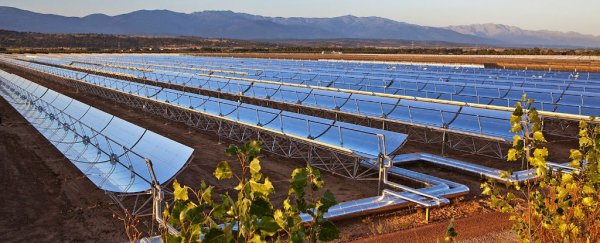The world's biggest solar thermal plant is being opened in the Moroccan city of Ouarzazate next month, and it's expected to bring renewable energy to 1 million locals for 20 hours a day.
Built on the vast desert plains of the Sahara, the plant will have unfettered access to sunlight during the day, and the resulting heat will be used to melt large amounts of salt. This mechanism will allow the system to retain heat energy to power a steam turbine at night, giving the locals access to almost-round-the-clock renewable energy.
"Whether you are an engineer or not, any passer-by is simply stunned by it," Paddy Padmanathan from Saudi-owned ACWA Power responsible for the solar thermal project, told Roger Harrabin at BBC News. "You have 35 soccer fields of huge parabolic mirrors pointed to the sky which are moveable so they will track the Sun throughout the day."
The new plant is part of Morocco's plan to get 42 percent of its electricity from renewables by 2020. Not only is the move a testament to the country's commitment to doing its part of mitigate the effects of climate change, but it will also free Morocco up from its dependence on important fossil fuels.
The BBC reports that the country has been 98 percent dependent on imported fossil fuels, and is currently importing its electricity from Spain, but Morroco's King Mohammed VI is now determined to put the huge potential for solar energy from Saharan sun, coastal wind from the Atlantic Ocean, and hydro power from the surrounding mountains to good use.
"We are convinced that climate change is an opportunity for our country," environment minister Hakima el Haite told Harrabin.
The team behind the plant predicts that not only will it give Morocco the first real chance it's ever had to free itself from imported electricity, but it will soon see the tables turned, with Europe likely to be buying renewable energy from Morocco in the coming decades. And this will all be facilitated by the plant's ability to store heat energy for later.
"If Morocco is able to generate electricity at 7, 8 cents per kilowatt - very possible - it will have thousands of megawatts excess," says Padmanathan from ACWA Power. "It's obvious this country should be able to export into Europe, and it will. And it will not need to do anything at all… [all] it needs to do is just sit there because Europe will start to need it."
[desert envy intensifies]
Now, if only that other country blessed with boundless solar, wind, and hydro power potential *cough Australia, cough* would smarten up and follow suit.
